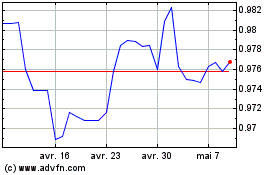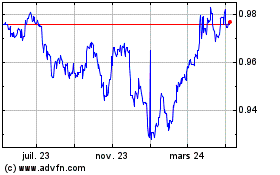ECB Cuts Interest Rates By 25 Bps As Lagarde Airs Concern On Eurozone Growth
17 Octobre 2024 - 11:40AM
RTTF2
The European Central Bank cut key interest rates by 25 basis
points, as expected on Thursday, as policymakers assessed that the
disinflation process is on track, and but they are increasingly
concerned over the health of the euro area economy following some
soft data released since the September policy session. The
Governing Council, led by ECB President Christine Lagarde, lowered
the deposit facility rate by a quarter basis point to 3.25 percent
following the rate-setting session held in Ljubljana, the capital
of Slovenia.
"…the decision to lower the deposit facility rate - the rate
through which the Governing Council steers the monetary policy
stance - is based on its updated assessment of the inflation
outlook, the dynamics of underlying inflation and the strength of
monetary policy transmission," the ECB said.
The central bank for the single bloc lowered rates by the same
volume in September and was then widely expected to opt for a cut
only in December.
However, economic data since the September session made
expectations for an imminent reduction stronger. While headline
inflation has slowed much, the core figure has not eased as fast as
the bank would like.
Further, an increasing number of indicators such as those from
the purchasing managers' survey and bank lending data have started
to signal a weakening Eurozone economy, something that the central
bank acknowledged in the policy statement. ECB policymakers have
also started to air doubts over the resilience of the labor
market.
Lagarde also expressed some concern over the recent economic
data as she responded to questions from reporters during the
post-decision press conference. The latest decision to lower rates
was unanimous, she said.
The ECB chief clearly refused to pre-commit an easing in
December, instead stressed on the data-dependency approach.
Answering a question, she said the ECB has not yet completely
"broken the neck of inflation". The bank is still looking at a soft
landing, Lagarde said.
Policymakers will be equipped with the latest set of ECB staff
macroeconomic projections in December.
The ECB left the forward guidance on interest rates unchanged
this time. Policy rates will be kept sufficiently restrictive for
as long as necessary to bring euro area inflation back to the 2
percent target, the ECB said.
"The Governing Council will continue to follow a data-dependent
and meeting-by-meeting approach to determining the appropriate
level and duration of restriction," the bank said.
"The Governing Council is not pre-committing to a particular
rate path," the bank reiterated.
ING economist Carsten Brzeski said the decision to cut rates
only five weeks after the last cut and with only very few pieces of
economic data since then, suggests that the ECB must have become
much more concerned about the eurozone's growth outlook and the
risk of inflation undershooting the target.
The latest rate cut can be seen as a signal that the ECB is now
in a hurry to bring interest rates down to a more neutral level,
the economist added.
Capital Economics economist Jack Allen-Reynolds said the data
released over the next weeks are likely to support 25 basis points
rate cuts at each of the next few meetings, at the very least.
Euro vs CHF (FX:EURCHF)
Graphique Historique de la Devise
De Oct 2024 à Nov 2024

Euro vs CHF (FX:EURCHF)
Graphique Historique de la Devise
De Nov 2023 à Nov 2024



